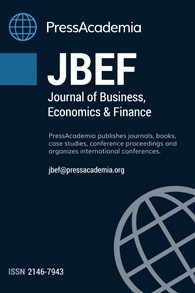THE MEDIATING ROLE OF LEADERSHIP STYLES ON THE ORGANIZATIONAL CITIZENSHIP BEHAVIOR AND INNOVATIVENESS RELATIONSHIP
THE MEDIATING ROLE OF LEADERSHIP STYLES ON THE ORGANIZATIONAL CITIZENSHIP BEHAVIOR AND INNOVATIVENESS RELATIONSHIP
Organizational,
___
- • Aragon-Correa, J.A., Garcia-Moreales, V.J. and Cordon-Pozo, E., 2007, “Leadership and organizational learning’s role on innovation and performance: Lessons from Spain”, Industrial Marketing Management, 36, pp.349-359.
- • Argyris, C. and Schon, D., 1978, “Organizational Learning”, Addison-Wesley, London.
- • Brief, A. ve S.J. Motowidlo (1986), “Prosocial Organizational Behavior”, Academy of Management Review, Vol.11: 710-725.
- • Dipaola, M. F., & Hoy, W. K. (2005). “Organizational citizenship of faculty and achievement of high school students”, High School Journal, 88(3), 35-45.
- • Graham, W. Jill. “Promoting Civic Virtue Organizational Citizenship Behavior: Contemporary Questions Rooted in Classical Quandaries From Political Philosophy”, Human Resource Management Review. Vol.10, No.l, 2000, ss. 70-81.
- • Katz, D. & Kahn, R. L., 1978, “The social psychology of organizations”, Second Ed., New York: Wiley.
- • Kidder, D.L., 2002, “The Influence of Gender on the Performance of Organizational Citizenship Behaviors”, Journal of Management, C.28, S.5, s.629-648.
- • Kluchohn, C., & Murray, H. A., 1948, “Personality in Nature, Society and Culture”. New York: Knopf.
- • LaPolice , C. C., 2002 , “Leader Behavior, Employee Attitudes and Organizational Characteristics as Moderators”, A Dissertation of Doctor, The George Washington University.
- • Law, J., 1994, “Organizing modernity” Blackwell, Oxford (In Felix T. Mavondo, Jacqueline Chinhanzi, ve Jillian Stewart, Learning Orientation and Market Orientation: Relationship with Innovation, Human Resource Practices and Performance, European Journal of Marketing, 2005, Vol.39, No:11/12, pp.1235- 1263).
- • McDonough, E. F., 2000, “Investigation on factors contributing to the success of cross-functional teams”, Journal of Product Innovation Management, 17, 221-235.
- • Luthans, F., 1995, “Organizational Behavior”, 7. Ed, McGraw-Hill Inc., New York.
- • Luthans, F., Organizational Behavior. Sixth Edition. New York: McGraw- Hill Press, 1992.
- • Mackenzie, B. Scoot, P., M. Podsakoff, and Rich,G.A., 1998, “Some Possible Antecedents and Consequences of in Role and Extra Role Salespersons Performance", Journal of the Academy of Marketing Science Vol 62 pp. 87-88.
- • Malhotra, N.K.1993, “Marketing Research”, Prentice Hall International Inc.
- • Mavondo, F. T., Chinhanzi, J. and Stewart, J. 2005, “Learning Orientation and Market Orientation: Relationship with Innovation, Human Resource Practices and Performance”, European Journal of Marketing, Vol.39, No:11/12, pp.1235-1263.
- • Moorman, H. R, Brian B. Niehoff and Organ D.O., 1993, “Treating Employees Fairly and Organizational Citizenship Behavior: Sorting to Effects Job Satisfaction, Organizational Commitment and Procedural Justice”, Employee Relationships and Right Journal Vol. 6, No 3, pp. 202-205.
- • Niehoff , 1993, “Justice as a Mediator of Relationship Between Methods of Monitoring and Organizational Citizenship Behavior”, Academy of Management Journal, Vol 36.
- • Organ, W. Dennis, 1990, “The Motivational Basis of Organizational Citizenship Behavior”, Research in Organizational Behavior, Vol. 12: 43-72.
- • Organ, D.W. and Lingl, A., 1995, “Personality, Satisfaction and Organizational Citizenship Behavior”, The Journal of Social Psychology, Vol.135, No. 3: 339-350.
- • Organ, W. Dennis, 1997, “Organizational Citizenship Behavior: It's Construct Clean-Up Time”, Human Performance, Vol. 10, No.2: 85-97.
- • Organ, W. D,Podsakoff P. and Mackenzie, S., 2006, “Organizational Citizenship Behavior”, Sage Publication, Inc., California.
- • Organ, D.W., 1988, “Organizational Citizenship Behavior”, Lexington, MA: Lexington Books.
- • Organ, D.W., and W. Clay Hamner, 1982, “Organizational Behavior”, Business Pub.
- • Organ, D.W. and Moorman, R. H., 1993, “Fairness and Organizational Citizenship Behavior: What Are the Connections?”, Social Justice Research, 6, pp. 5-18
- • Orpen, C., 1994, “The Effect of Organizational Commitment on the Relationship Between Procedural and Distributive Justice”, The Journal of Social Psychology, 134(1), pp. 135-136.
- • Oshagbemi, T., 2000, “Satisfaction with Co-Workers’ Behavior”, Employee Relations, Vol. 22, No.l: 88- 106.
- • Peterson, R. S., Smith, D. B., Martorana, P. V. and Owens, P. D. (2003), The impact of chief executive officer personality on top management dynamics: One mechanism by which leadership affects organizational performance, Journal of Applied Psychology, 88 (7), pp.795-808.
- • Porter, M., 1996, “What is strategy?”, Harvard Business Review, 74 (6), pp.61-78.
- • Prahalad, C. K. and Hamel, G., 1991, “Competing for the Future”, Boston, Harvard Business School Press.
- • Schein, E. H., 1993, “On dialogue, culture and organizational learning”, Organization Dynamics, Vol.22, No.2, pp.40-51.
- • Waldman, D. A., Ramirez, G. A., House, R. J. and Puranam, P., 2001, “Does leadership matter? CEO leadership attributes and profit ability under conditions of perceived environmental uncertainty”, Academy of Management Journal, 44, pp.134-143.
- • Wang, C. L., 2008, “Entrepreneurial orientation, learning orientation, and firm performance”, Entrepreneurship Theory and Practice, July, pp.635-657.
- • Yousef, D. A., 2000, “Organizational commitment: A mediator of the relationships of leadership behavior with job satisfaction and performance in non-western country”, Journal of Managerial Psychology, 15 (1), pp.6-28.
- • Yukl, G., 2002, “Leadership in Organizations”, Fifth Edition, Prentice Hall Inc., New Jersey.
- • Zhu, W., Chew, I. K. H. and Spangler, W. D., 2005, “CEO transformational leadership and organizational outcomes: The mediating role of human capital enhancing human resource management”, Leadership Quarterly, 16 (1), pp.39-52.
- Yayın Aralığı: Yılda 4 Sayı
- Başlangıç: 2012
- Yayıncı: PressAcademia
FOREIGN OWNERSHIP AND CORPORATE PERFORMANCE IN TURKEY
ELECTRICITY SUPPLIER SWITCHING: A CONCEPTUAL MODEL BASED ON MIGRATION THEORY
EXTERNAL DEBT AND ECONOMIC GROWTH: NEW EVIDENCE FOR AN OLD DEBATE
BANK COMPETITION, CONCENTRATION AND RISK-TAKING IN THE TURKISH BANKING INDUSTRY
TRACING BACK THE SIGNS OF COMPLEXITY THINKING IN MANAGEMENT:
EFFECT OF BRAND EQUITY ON FIRMS’ FINANCIAL PERFORMANCE IN CONSUMER GOODS INDUSTRIES
Catherine Wahito Kahuria, Gabriel Waweru
